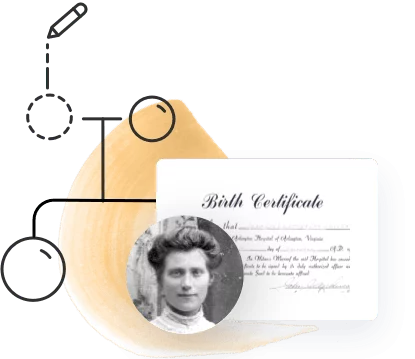
Historically, churches served as the primary record-keepers in many communities. Even in more recent centuries, they filled the role of record-keepers and document storage spots. Church records represent some of the oldest documents used by genealogy researchers, though this helpfulness comes with some challenges. For example, most were handwritten and may use symbols or abbreviations specific to the location or the church itself.
When you can discover and decipher church records, however, you will find a wealth of data about your lineage stretching back further than you might expect. These records can trace your family history across generations. You can even find details not directly related to religious rites, such as names of godparents or social status.
Key notes about using church records in genealogical research
- Most church records focus on birth, marriage, and death records.
- Lack of certain church records can reveal non-marital birth lines or excommunication.
- Contact churches directly to ask about archives and record access
- Church records are sometimes harder to read due to Latin and script use
Types of church records to research
The most common records kept by the church focus on sacraments and ceremonies overseen or organized by the religion itself.
- Births and baptisms: These can reveal legal names, the parents’ names, other family members in attendance including godparents, and affiliation.
- Banns and marriages: Banns are announcements of intention to marry. In modern terms, banns are similar to engagement announcements. This is where in-law relationships come to light and let the family tree branches grow.
- Communion and confirmation: These celebrations take place as a child grows into an adult in the church and are only practiced or recorded in some sects.
- Death and burial: People who were involved with the church their whole lives are likely to get buried in the associated graveyard or crypt. Dates and family connections are especially useful.
What information can a church record reveal?
Besides obvious details about names and dates, church records focus heavily on family ties. Of course, a baptism record would include the parents. It will also include other relatives and godparents, who may or may not be blood relatives. Marriage records track the merging of different family trees.
Information about religious affiliation and practices can give genealogy researchers considerable insight into beliefs and expectations in the area or time period. This can translate into understanding about social status. Did they have a large funeral full of pomp or was it a small burial in a less prestigious area of the churchyard? Is there any note that a child was illegitimate and, while their birth record exists, no baptism occurred?
How to access church records
Online databases such as those on MyHeritage are always the first place to look for any type of historical records. It is the easiest and most accessible option. To dive deeper into research, however, go directly to the church itself. Parish or diocese archives may exist even if the actual church building your ancestors went to was torn down long ago. In some countries, especially those with state religions, the national government may keep records, too.
Oldest church record challenges
More modern records kept by churches and other religious organizations look and feel much like official legal documents. They are typed up on set forms and mostly digitized. The further you go back in time, the more difficult it becomes to understand what you are looking at.
Language and writing issues top the list. In some religions such as Roman Catholicism, early records may exist only in Latin. Most people are unfamiliar with Latin, which adds a layer of difficulty to interpreting these documents. Translating from a variety or still used European languages is much easier, but there are ways to get around this with online translation apps. Messy or fancy handwriting can present other challenges.
Besides this, access remains a possible problem for church records, especially those that cover more recent events. Since these are technically privately owned by the churches, there are no rights to public use like with government or legal records. In most cases, there is no reason why a church would refuse access to older documents.
Church records offer a potential wealth of information about your family tree that may not be present on more official paperwork. You can discover other family members, community and religious connections, and unique events that bring more insight into how ancestors lived long ago.
MyHeritage offers access to a wide range of digitized church records and other historical documents to help you grow your family tree. Begin your search into church records and other historical resources with MyHeritage and uncover the deeper stories of your ancestors
FAQs about church records in genealogy
How far back to church records go?
The answer to that question depends on the branch of religion and how prominent they were throughout history. The Roman Catholic and Lutheran churches probably have the longest kept records. They could extend back to the 1500s. Obviously, United States records began in the 1700s only.
Are church records legal documents?
No. Churches have private control over their own records. They are not considered legal in most cases. However, they were (and still are) accepted in some locations as proof of birth, marriage, and death if no government certificate was issued. That does not mean they are untrustworthy from an ancestry research perspective.
What do you do if the church no longer exists?
Even if the actual building does not exist, the church organization behind it undoubtedly does. Contact the parish or diocese offices or whatever the regional religious authority exists in that area. They will know what happened to the records if any still exist.
What unique information might you find from church records?
Some of the most unique perspectives come from discovering that certain records do not exist. For example, if there was a birth record but no baptism, it could signify a baby born out of wedlock. Marriage records could show interfaith relationships, and lack of one even though you know the couple was together could indicate common-law or unsanctioned unions.
Do non-Christian religious institutions keep similar records?
Absolutely. Temples, synagogues, mosques, and other religious places often kept very similar records of the people who attended, were born, married, and died in their community. Many of the same recommendations for contacting the leaders and asking for records pertain to any faith system.



